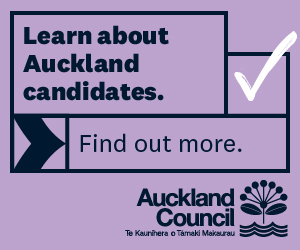
Auckland Council

Local democracy
Local government is a foundational part of our democracy. But local democracy isn’t just about holding elections every three years – it’s about the day-to-day ways people have their say in the decisions that affect us all.

Local democracy
Local government is a foundational part of our democracy. But local democracy isn’t just about holding elections every three years – it’s about the day-to-day ways people have their say in the decisions that affect us all.
Meet monthly with university public policy clubs – engages this transient population, ensures their representation, and also prepares them.
Meet informally with iwi and other minority communities in activities/spaces which they feel comfortable, eg fishing, pot-luck, music jams.
Set boundaries and flexible working hour standards for ALL council employees and contractors, and make these public, to set an example.
Encourage greater public engagement by giving people a feeling that they will be listened to and that common sense will prevail.
Implement a fair and transparent salary scale that makes it impossible for giant amounts to be paid out.
Encourage minorities to have a voice. Māori to have equal (but not superior) rights with all other New Zealanders in all issues.
Empower local communities by improving engagement, addressing council funding inequities and providing for local decision-making.
Provide for diverse voices by continuing the demographic advisory panels on Auckland Council.
Committed to Te Tiriti partnership including support for Māori wards, bilingual signage and the role of the Tūpuna Maunga Authority.
Eliminate as much as possible secret council 'workshops' and stop the gaming and thwarting of the transparency principles of LGOIMA.
Remind council of its statutory obligation to consult the public equally in an open and meaningful way including provision of all information.
Constantly remind council staff and elected members of the principle: 'councils exist to serve the public – not the other way round'.
Meet monthly with university public policy clubs – engages this transient population, ensures their representation, and also prepares them.
Meet informally with iwi and other minority communities in activities/spaces which they feel comfortable, eg fishing, pot-luck, music jams.
Set boundaries and flexible working hour standards for ALL council employees and contractors, and make these public, to set an example.
Encourage greater public engagement by giving people a feeling that they will be listened to and that common sense will prevail.
Implement a fair and transparent salary scale that makes it impossible for giant amounts to be paid out.
Encourage minorities to have a voice. Māori to have equal (but not superior) rights with all other New Zealanders in all issues.
Empower local communities by improving engagement, addressing council funding inequities and providing for local decision-making.
Provide for diverse voices by continuing the demographic advisory panels on Auckland Council.
Committed to Te Tiriti partnership including support for Māori wards, bilingual signage and the role of the Tūpuna Maunga Authority.
Eliminate as much as possible secret council 'workshops' and stop the gaming and thwarting of the transparency principles of LGOIMA.
Remind council of its statutory obligation to consult the public equally in an open and meaningful way including provision of all information.
Constantly remind council staff and elected members of the principle: 'councils exist to serve the public – not the other way round'.
Mayor
Compare the mayoral candidates in your area
Local council
Compare the candidates for your city or district council
Regional council
Compare the candidates for your regional council
Local board
Compare the candidates for your local or community board










